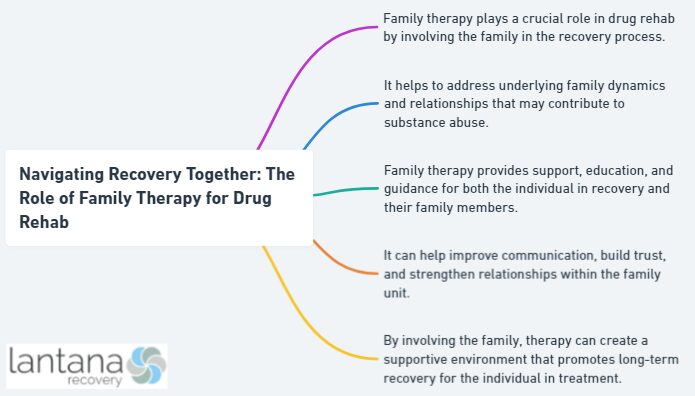Drug addiction affects not only the individual but also their family. Family therapy for drug rehab is a powerful tool that can help families heal together and support their loved one through the recovery process. In this blog post, you’ll learn about the importance of family therapy in addiction treatment, how it’s structured, and the many benefits it provides. You’ll also discover specialized family therapy modalities and how they can be integrated with other recovery services for a comprehensive approach to healing. So let’s dive in and explore the transformative power of family therapy in drug rehabilitation.
Key Takeaways
- Family therapy in drug rehabilitation facilitates communication and healing within the family system to improve relationships, provide support for recovery, and reduce relapse risks.
- Tailored interventions focus on teaching communication skills and creating positive activities while considering each family’s unique challenges.
- Incorporating family therapy into addiction treatment strengthens bonds, builds communication skills & promotes long-term sobriety for both the individual in recovery & their loved ones.
Understanding Family Therapy in Drug Rehabilitation
Family therapy in drug rehabilitation is designed to address the family as a unit, provide support, and work to resolve any issues that may be contributing to addiction, including mental health services administration. The focus of family therapy can range from strengthening family bonds to fostering communication, promoting long-term sobriety, addressing resistance and denial, managing expectations, and healing from past traumas.
Family therapy is an evidence based therapy for drug rehab which addresses issues within the family system, has demonstrated improvements in family-relationship functioning, support for the person in recovery, and a reduced risk of relapse into substance use disorder.
The Therapeutic Approach
In family therapy, an assessment of family dynamics, communication, and roles is conducted to formulate a personalized treatment plan, especially helpful in cases of adolescent substance abuse. The therapist utilizes family therapy interventions that focus on relationships, such as teaching communication skills and increasing positive relationship activities. These are essential components of behavioral family counseling.
After securing abstinence, counselors tend to incorporate interventions focusing on relationships, similar to the ones used in systemic family therapy, to address family dynamics and enhance communication. Solution-focused brief therapy is another approach used in family therapy, emphasizing instances when the problem does not occur and assisting the family in recognizing attainable solutions that bolster motivation and optimism for behavioral change.

The Whole Family’s Journey
Family therapy acknowledges that addiction affects the entire family and aims to support each member throughout the recovery process. Addiction can strain relationships, disrupt family dynamics, and cause emotional and psychological distress for family members, leading to feelings of:
- guilt
- shame
- anger
- resentment
Hence, it’s imperative that the entire family participates in support and therapy sessions to confront addiction challenges jointly.
Support groups such as Al-Anon, Nar-Anon, and Adult Children of Alcoholics are available for family members of those struggling with addiction. These groups offer a sense of community and understanding, allowing family members to connect with others who face similar circumstances and gain valuable insights into coping with a loved one’s addiction.
As research indicates, family involvement in addiction treatment is critical because individuals receiving familial support have a higher likelihood of persisting with treatment, ceasing substance misuse, and maintaining abstinence. By addressing the unique circumstances of families dealing with addiction, family therapy plays a critical role in supporting the recovery process.
Tailored Family Interventions
Family interventions in drug rehabilitation involve several steps to tailor the intervention to the distinct requirements and difficulties of each family. These steps include:
- Assessment and diagnosis
- Planning and preparation
- Involving professionals
- Creating a comfortable environment
- Clear and compassionate communication
- Adherence and follow-up
By following these steps, family interventions can effectively support recovery and development in drug rehabilitation.
A personalized approach in tailored family interventions allows for addressing each family’s unique challenges and needs, fostering healing, growth, and a positive shift. This customized approach helps ensure that therapy is effective and relevant to the specific circumstances and dynamics of the family involved in the recovery process.
Key Benefits of Incorporating Family Therapy into Addiction Treatment

Family therapy within addiction treatment provides manifold benefits, including the strengthening of family bonds, communication enhancement, and the promotion of long-term sobriety. By addressing the unique circumstances of families in which substance misuse and substance use disorders occur, family therapy can optimize treatment efficacy, provide family members with support and education, and help reconstruct relationships, reinforce communication, and foster general well-being for both the individual in recovery and their family members.
Strengthening Family Bonds

In a safe and supportive environment, family therapy enables family members affected by addiction to rebuild trust and fortify their relationships. Techniques such as:
- recreating communication channels
- improving communication skills
- utilizing family sculpting and genograms
- engaging in the Chinese Whisper exercise
are utilized to restore trust among family members.
Family therapy also plays a pivotal role in addressing and resolving conflicts among family members in addiction recovery. Through therapy, family members learn communication strategies, active listening techniques, and conflict-resolution skills. Providing a safe, neutral environment, the therapist facilitates everyone’s open and honest expression of thoughts and feelings, thereby promoting communication. By addressing conflicts and improving interaction between family members, family therapy plays a crucial role in supporting the recovery process.
Building Communication Skills
With its importance in facilitating the exchange of feelings and emotions between individuals, effective communication becomes a vital component of addiction recovery, providing the necessary support for success. In family therapy for addiction, communication exercises may include:
- Non-verbal communication exercises to hone listening skills
- Activities such as yoga, meditation, art, and music to foster joy and communication
- Games, exercises, and direct questions to promote communication and understanding within the family
Improved communication in family therapy can be beneficial for addiction recovery by:
- Increasing understanding and empathy among family members
- Promoting open and honest dialogue
- Reinforcing relationships and rebuilding trust
- Addressing codependency and enabling behaviors
- Providing an opportunity to learn effective communication skills.
If you want to know more about the recent evidence based treatment approaches for drug addiction, read our article on executive therapy for drug rehab, a tailored solutions for high-performers.
Promoting Long-Term Sobriety
Family therapy assists in sustaining long-term sobriety by addressing the root causes and creating a strong support system for the individual undergoing recovery. Community reinforcement approaches, such as the Community Reinforcement and Family Training (CRAFT) model, teach family members strategies to encourage their loved one to seek treatment. CRAFT aims to modify the interactions between family members and the individual with substance use disorder, making sober behavior more rewarding than continued substance use.
This approach assists family members in learning effective strategies to motivate their loved ones to engage in treatment and support their recovery journey. Additionally, family therapy provides a safe and therapeutic atmosphere for both the individual with substance use disorder and their family members to address underlying issues, improve communication, and strengthen relationships.
Ultimately, community reinforcement approaches and family therapy combine to create a comprehensive and integrated approach to substance abuse treatment.
Navigating Common Challenges in Family Therapy
During family therapy sessions, there may be encounters with:
- Resistance
- Denial
- The management of expectations
- The healing of past traumas
Addressing these challenges can help families navigate the complex landscape of addiction recovery and ensure that therapeutic interventions are effective and relevant to each family’s specific needs.
Addressing Resistance and Denial

Resistance and denial can have a profound effect on the process of family therapy in drug rehabilitation. In family therapy, therapeutic techniques such as:
- Motivational Interviewing (MI)
- Cognitive-Behavioral Therapy (CBT)
- Family Systems Therapy
- Psychoeducation
- Solution-Focused Therapy
are used to address resistance and denial.
The addressing of resistance and denial in family therapy aids family members in accepting addiction’s reality and engaging in the recovery process. By fostering an environment of open communication and attentively listening to the perspectives of each family member, therapists can aid in exploring and comprehending the root causes of resistance and denial and provide guidance and support for overcoming these challenges.
Managing Expectations
In family therapy, managing expectations is key to guarantee that all participants understand the rehabilitation process and maintain realistic objectives. Strategies such as:
- Providing education about the effects of substance misuse on the family
- Educating them about the recovery process
- Setting healthy boundaries
- Seeking out opportunities for education
- Incorporating family therapy
can be employed to educate family members on realistic timelines of recovery in drug rehabilitation.
By understanding the nature of addiction as a chronic, relapsing disorder and recognizing that recovery is an ongoing process, family members can maintain realistic expectations and provide the necessary support for their loved one’s successful recovery.
Healing from Past Traumas
Providing a safe haven for healing from past traumas, family therapy also addresses unresolved issues associated with addiction. Various techniques utilized in family therapy to assist in healing from past traumas include:
- Trauma-focused therapy
- Cognitive Behavioral Therapy (CBT)
- Eye Movement Desensitization and Reprocessing (EMDR)
- Art therapy
- Inner child healing
Healing from past traumas is integral to the drug rehabilitation process, as it addresses the underlying issues that may have led to drug abuse. By healing from these traumas, individuals can gain insight into their emotions and develop healthier coping strategies, reducing the need to self-medicate with drugs.
Specialized Family Therapy Modalities for Substance Abuse Treatment
There exists a variety of specialized family therapy modalities for substance abuse treatment, such as Functional Family Therapy (FFT), Brief Strategic Family Therapy (BSFT), and Multidimensional Family Therapy (MDFT). Each of these therapies offers unique approaches and techniques to address the complex issues associated with addiction and support both the individual and their family in the recovery process.
Functional Family Therapy

Functional Family Therapy (FFT) is a type of family therapy that concentrates on transforming maladaptive patterns and enhancing family functioning through a three-phase process. The three phases of FFT are engagement and motivation, behavior change, and generalization of skills.
Studies have demonstrated that FFT is successful in reducing and sustaining lowered levels of substance use for up to 15 months following the intervention. By addressing the unique challenges and needs of each family, FFT provides a comprehensive approach to addiction treatment and supports long-term recovery.
Brief Strategic Family Therapy
Brief Strategic Family Therapy (BSFT) is an evidence-based approach to reduce substance abuse by targeting family interactions and utilizing problem-focused strategies. The objective of BSFT is to reduce substance abuse through the assessment of family interactions and the implementation of problem-focused strategies.
Research suggests that BSFT may have a positive impact on other family members, particularly those whose parents had the highest consumption rates. By focusing on family interactions and implementing targeted strategies, BSFT offers an effective approach to addressing substance abuse and improving family functioning.
Multidimensional Family Therapy
Multidimensional Family Therapy (MDFT) is an integrative outpatient treatment for adolescents with drug and behavior problems. It combines family therapy, individual therapy, drug counseling, and multiple-systems oriented intervention. MDFT focuses on both intrapersonal and interpersonal factors, with the goal of addressing issues related to individual functioning, relational development, and environmental influences that may be contributing to problematic behavior.
By targeting multiple domains and addressing both substance use and mental health issues, MDFT offers a comprehensive approach to addiction treatment and recovery. This developmentally oriented family-based treatment helps families:
- Develop problem-solving skills
- Address issues at the level of the adolescent
- Address issues at the level of the family
- Address issues at the level of the broader social context
Integrating Family Therapy with Other Recovery Services
For further support in the recovery process, family therapy can be integrated with mental health services, support groups, and community reinforcement approaches. By integrating these additional services, families can access a more comprehensive and holistic approach to addressing the complex issues associated with addiction and recovery.
Collaboration with Mental Health Services
Collaborating with mental health services in the drug recovery process has numerous benefits, such as:
- Integrating behavioral health, addiction treatment, and healthcare
- Ensuring that both substance use and mental health issues are addressed
- Leading to more comprehensive and effective treatment
By addressing these multiple needs simultaneously, individuals in recovery have a greater likelihood of achieving positive outcomes. It is essential for mental health services and family therapy providers to work together to address these challenges and ensure comprehensive and effective treatment for individuals and their families.
The Role of Support Groups
Support groups play a pivotal role in the recovery process of a drug addict’s family by providing a secure and nurturing environment for family members to express their experiences, emotions, and struggles. Support groups offer a sense of solidarity and empathy, allowing family members to connect with others who face similar circumstances.
By providing education and resources to equip family members with knowledge of addiction and coping strategies, support groups at a drug rehab like Lantana Recovery can help reduce feelings of seclusion and judgment, and offer encouragement and optimism for the recovery journey. Through sharing and learning from others, family members can build resilience and acquire effective coping mechanisms to manage the difficulties of having a loved one with a drug addiction.
Community Reinforcement Approaches
Community reinforcement approaches, such as the Community Reinforcement and Family Training (CRAFT) model, teach family members strategies to encourage their loved one to seek treatment. CRAFT aims to modify the interactions between family members and the individual with substance use disorder, making sober behavior more rewarding than continued substance use.
This approach assists family members in learning effective strategies to motivate their loved ones to engage in treatment and support their recovery journey. Additionally, family therapy provides a safe and therapeutic atmosphere for both the individual with substance use disorder and their family members to address underlying issues, improve communication, and strengthen relationships.
Finding the Right Family Therapist
An essential step towards your family receiving the best possible support and guidance throughout the addiction recovery process is to find the right family therapist. Researching qualifications, experience, and treatment approaches can help you find a therapist who is a good fit for your family’s specific needs and circumstances.
Consider the following when choosing a therapist for your family dealing with substance abuse:
- The therapist’s experience in working with families dealing with substance abuse
- Their understanding of family dynamics
- Their ability to address both addiction and co-occurring mental health issues
- Inquire about their preferred treatment modalities, such as Functional Family Therapy, Brief Strategic Family Therapy, or Multidimensional Family Therapy, and assess whether they align with your family’s needs and goals.
Ultimately, finding the right family therapist is crucial to ensuring that your family receives the support, guidance, and therapeutic interventions needed to navigate the complex landscape of addiction recovery and promote long-term healing and growth.
Summary
Family therapy plays a vital role in drug rehabilitation by addressing the family as a whole, providing support, and resolving issues that may contribute to addiction. With specialized therapy modalities and integration with other recovery services, family therapy offers a comprehensive and holistic approach to healing. By rebuilding trust, strengthening relationships, improving communication, and supporting long-term sobriety, family therapy can transform the lives of individuals and their families impacted by addiction. Embrace the power of family therapy and take the first step towards a brighter, healthier future for your family.
Frequently Asked Questions
What is the family treatment method?
Family therapy is a treatment designed to help families improve communication, manage conflicts and build stronger relationships. It is specifically tailored to improve family functioning and mental health.
What is the difference between family counseling and family therapy?
Family counseling and family therapy are often used interchangeably, but they do have distinctions. Family counseling usually involves talking to help individuals and families work through conflicts, barriers, or mental health issues, while family therapy is provided by a licensed therapist with special credentials.
What to expect from a family therapy session?
Family therapy sessions typically involve the entire family working together to discuss the history of any issues and each individual’s view on them. This provides an opportunity to collaborate and make meaningful changes.
What is the role of a therapist in family therapy?
Marriage and family therapists are mental health professionals trained in psychotherapy and family systems who conduct individual and group sessions to diagnose disorders, mediate conflicts within families, and guide clients through difficult life changes. They also help clients discuss their emotions, process their reactions, and adjust to challenging decisions.
What role does family play in addiction?
Family plays a vital role in addiction as its members often create an environment of codependency which leads to the formation of an individual’s aversion to self-orientation. Ultimately, individuals ‘become’ the roles they play within the family system.



